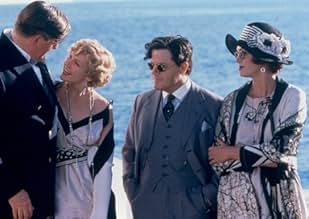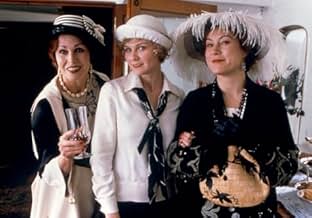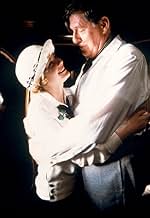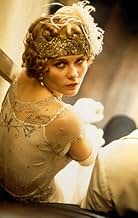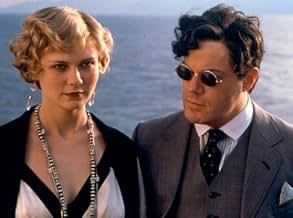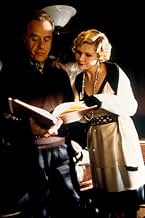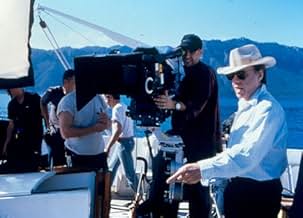VALUTAZIONE IMDb
6,4/10
9354
LA TUA VALUTAZIONE
Aggiungi una trama nella tua linguaSemi-true story of the Hollywood murder that occurred at a star-studded gathering aboard William Randolph Hearst's yacht in 1924.Semi-true story of the Hollywood murder that occurred at a star-studded gathering aboard William Randolph Hearst's yacht in 1924.Semi-true story of the Hollywood murder that occurred at a star-studded gathering aboard William Randolph Hearst's yacht in 1924.
- Premi
- 1 vittoria e 1 candidatura in totale
Zoe Mavroudi
- Servant
- (as Zoi Mavroudi)
Despina Mirou
- Servant
- (as Despina Morou)
Recensioni in evidenza
I am abhorred that the Oscars could ignore this film for all the categories it so well deserved:
Best Actress (Kirsten Dunst) Best Actor (Edward Herrmann) Best Costume Design Best Cinematography
And those are just the obvious ones!
Peter Bogdanovich is one of my favorite Directors. He has an amazingly vast Encyclopedia of knowledge about Hollywood during this time. He was good friends with the master Orsen Wells and even did the Commentary for Citizen Cane in Wells' place. He was unquestionably the perfect Director for putting this story to screen.
Kirsten Dunst is remarkable playing 24 year-old Marion Davies at only 18. She does a superb job in the role and deserved a lot more attention than she was awarded.
I strongly disagree with comments that the supporting cast was bad. Everybody was perfect for their role! The sax player WAS a sax player (not an actor) from Berlin (where most of the movie was filmed) and he did fantastic! (He only had one line for goodness sake!)
Though I would concur that Jennifer Tilly played Louella Parsons a bit unlike we would expect, I support her decision to treat her this way for the sake of this film. She lightened up the film with her bumbling silliness. So what if Lolly wasn't like that in real life? It worked well for the movie.
My only (slight) complaint was the decision to have one of the flappers briefly flash us (show her chest) during a party scene with her, the other flapper, the sax player and Chaplin. It was unnecessary and felt out of place with an otherwise clean movie. My guess is this was the reason for the PG-13 rating.
There is hardly any language - in fact Bogdanovich changed the film's only F-word to "screw" to clean it up even more than the original script. This works much better for the period than filling it with 21st century language.
Anybody interested in the 20's, William Randolph Hearst or 'The Golden Age of Hollywood' MUST see this movie!
8½ out of 10. (I can't decide between 8 and 9!)
Best Actress (Kirsten Dunst) Best Actor (Edward Herrmann) Best Costume Design Best Cinematography
And those are just the obvious ones!
Peter Bogdanovich is one of my favorite Directors. He has an amazingly vast Encyclopedia of knowledge about Hollywood during this time. He was good friends with the master Orsen Wells and even did the Commentary for Citizen Cane in Wells' place. He was unquestionably the perfect Director for putting this story to screen.
Kirsten Dunst is remarkable playing 24 year-old Marion Davies at only 18. She does a superb job in the role and deserved a lot more attention than she was awarded.
I strongly disagree with comments that the supporting cast was bad. Everybody was perfect for their role! The sax player WAS a sax player (not an actor) from Berlin (where most of the movie was filmed) and he did fantastic! (He only had one line for goodness sake!)
Though I would concur that Jennifer Tilly played Louella Parsons a bit unlike we would expect, I support her decision to treat her this way for the sake of this film. She lightened up the film with her bumbling silliness. So what if Lolly wasn't like that in real life? It worked well for the movie.
My only (slight) complaint was the decision to have one of the flappers briefly flash us (show her chest) during a party scene with her, the other flapper, the sax player and Chaplin. It was unnecessary and felt out of place with an otherwise clean movie. My guess is this was the reason for the PG-13 rating.
There is hardly any language - in fact Bogdanovich changed the film's only F-word to "screw" to clean it up even more than the original script. This works much better for the period than filling it with 21st century language.
Anybody interested in the 20's, William Randolph Hearst or 'The Golden Age of Hollywood' MUST see this movie!
8½ out of 10. (I can't decide between 8 and 9!)
that involves jealously and murder. I didn't know what this movie was about before watching it. Afterwards I was impressed. This made a good movie because it is based on real life events that are still a mystery. I had never heard this story before, but it was very interesting. In the beginning, we get to learn about the cast of characters on the yacht and their relationships. This was well done and not boring like all the characters in Godsford Park. We see the jealously of RW toward Chaplin because Chaplin has an eye on RW's mistress, Marion. Then, RW does something he regrets and tries to cover it up from his other guests. Kristen Dunst was good as well all the actors. I liked the music and the outfits and hair styles.
FINAL VERDICT: Not for action buffs. A good drama with interesting characters and good story.
FINAL VERDICT: Not for action buffs. A good drama with interesting characters and good story.
`The Cat's Meow' is a mildly enjoyable telling of a notorious tall story that has been told in Hollywood for nearly eighty years.
Super-magnate William Randolph Hearst (Edward Herrmann) invites a diverse mix of Hollywood biggest names and its oddest fringe dwellers to celebrate the birthday of famed director Thomas Ince (Cary Elwes) aboard his luxury yacht. Things begin to fall apart when Hearst suspects a guest - none other than Charlie Chaplin (Eddie Izzard), the most famous man in the world - of having an affair with his actress girlfriend, Marion Davies (Kirsten Dunst).
Although the film is entertaining, there is something underwhelming about it. Its stage origins are obvious - characters perambulate from plot point to plot point, spouting exposition, never appearing much more than caricatures, and thus failing to evoke much sympathy.
The casting of Eddie Izzard in the pivotal role of Charles Chaplin is a grave mistake, though the script saddles him with a most unsatisfactory characterisation of Chaplin to work with. Chaplin was not a serial romancer, as is implied in the film, but a serial seducer. He would have been the last person to urge a woman to run away with him on the basis of undying love. He spent his most famous years running from women who suggested exactly that, freely admitting to them that while sex was a pleasant diversion, his work came before any woman. It's a casting decision that is an obvious attempt to distance us from the Little Tramp as opposed to Chaplin the real man, but we never get a true sense of either. Ironically, Izzard actually resembles the real Thomas Ince far more than does Cary Elwes, and as a real-life cabaret performer could conceivably have brought the flamboyance and eccentricity of the real-life director to life better than Elwes does.
The film also takes an annoyingly facile view of women, perpetuating the dull cliche that all women spent the 1920s with a bad case of St Vitus' dance and addicted to laughing gas. The grating performances of Claudie Blakley and Chiara Schoras in particular throw the beautifully understated efforts of Kirsten Dunst into high relief. Dunst feels like the only real person in this cast of cartoon characters - beautiful, funny, and vital, she is the best thing in the film. Yet there is never any moment in the movie to suggest the true depth of her dedication and passion for Hearst (portrayed as a roly-poly father figure rather than the hard nosed businessman he was), nor any justification for leaving him for the roguish but uncharismatic Chaplin. Unfortunately, the more interesting conflicts in Marion's life, such as her growing alcoholism and her dissatisfaction with Hearst's insistence on casting her in leaden romances rather than the comedy to which she was so obviously suited, are only touched on lightly.
Though it could have been a thought-provoking and complex experience, as Joanna Lumley's poignant final statements imply (and like `Gosford Park' to which it has been compared), in the end `The Cat's Meow' doesn't feel much more substantial than your average game of Cluedo.
Super-magnate William Randolph Hearst (Edward Herrmann) invites a diverse mix of Hollywood biggest names and its oddest fringe dwellers to celebrate the birthday of famed director Thomas Ince (Cary Elwes) aboard his luxury yacht. Things begin to fall apart when Hearst suspects a guest - none other than Charlie Chaplin (Eddie Izzard), the most famous man in the world - of having an affair with his actress girlfriend, Marion Davies (Kirsten Dunst).
Although the film is entertaining, there is something underwhelming about it. Its stage origins are obvious - characters perambulate from plot point to plot point, spouting exposition, never appearing much more than caricatures, and thus failing to evoke much sympathy.
The casting of Eddie Izzard in the pivotal role of Charles Chaplin is a grave mistake, though the script saddles him with a most unsatisfactory characterisation of Chaplin to work with. Chaplin was not a serial romancer, as is implied in the film, but a serial seducer. He would have been the last person to urge a woman to run away with him on the basis of undying love. He spent his most famous years running from women who suggested exactly that, freely admitting to them that while sex was a pleasant diversion, his work came before any woman. It's a casting decision that is an obvious attempt to distance us from the Little Tramp as opposed to Chaplin the real man, but we never get a true sense of either. Ironically, Izzard actually resembles the real Thomas Ince far more than does Cary Elwes, and as a real-life cabaret performer could conceivably have brought the flamboyance and eccentricity of the real-life director to life better than Elwes does.
The film also takes an annoyingly facile view of women, perpetuating the dull cliche that all women spent the 1920s with a bad case of St Vitus' dance and addicted to laughing gas. The grating performances of Claudie Blakley and Chiara Schoras in particular throw the beautifully understated efforts of Kirsten Dunst into high relief. Dunst feels like the only real person in this cast of cartoon characters - beautiful, funny, and vital, she is the best thing in the film. Yet there is never any moment in the movie to suggest the true depth of her dedication and passion for Hearst (portrayed as a roly-poly father figure rather than the hard nosed businessman he was), nor any justification for leaving him for the roguish but uncharismatic Chaplin. Unfortunately, the more interesting conflicts in Marion's life, such as her growing alcoholism and her dissatisfaction with Hearst's insistence on casting her in leaden romances rather than the comedy to which she was so obviously suited, are only touched on lightly.
Though it could have been a thought-provoking and complex experience, as Joanna Lumley's poignant final statements imply (and like `Gosford Park' to which it has been compared), in the end `The Cat's Meow' doesn't feel much more substantial than your average game of Cluedo.
Obsession, combined with jealousy, was the impetus for an incident that occurred in November of 1924, aboard the yacht of media mogul William Randolph Hearst, and which in the years since has become the stuff of Hollywood legend and lore. The story has many versions, but the `whisper told most often,' is the one recounted in `The Cat's Meow,' directed by Peter Bogdanovich, a dramatization of what may or may not have happened during that extended weekend birthday-party cruise in honor of pioneer film director, Thomas Ince, which included an eclectic guest list of the rich, famous and powerful. What is known, is that the party ended with the death of one of the guests, and that foul play and an ensuing cover-up have long been suspected, but never proved. And one thing is certain: Not a single person aboard the yacht at the time has ever spoken of what happened, at least not publicly; but there are those who believe to this day, that someone just may have gotten away with murder.
Once a powerful force in a young Hollywood, Thomas Ince (Cary Elwes)-- who had formed Triangle Films with D.W. Griffith and Mack Sennett, and later founded Paramount Studios with Adolph Zukor-- has fallen on hard times. Once responsible for forty pictures a year, he now struggles to get a single film made. And, his birthday aside, he has decided to mix business with pleasure during this cruise, pitching an idea to Hearst (Edward Herrmann), to combine their resources and make movies together. Hearst, however, has other things on his mind; rumor has it that his mistress, Marion Davies (Kirsten Dunst), is being courted by Charlie Chaplin (Eddie Izzard), and he has brought them together, here, to observe and decide for himself if anything untoward is going on between them. Hearst is not only in love with Davies, but is obsessed with her, as well as the course of her career, and he's not about to let this baggy-pants comic actor interfere. And Hearst, a powerful and controlling man, always gets what he wants-- and what he wants right now is for this business with Chaplin to disappear. So it is, that in the midst of celebration, paranoia overtakes the host of the party, and it's about to cast a pall over the proceedings and ultimately involve everyone aboard in one of the greatest unsolved mysteries ever to come out of Tinsel Town. It's a story that Hearst keeps out of the papers, making sure in his own way that dead men, indeed, tell no tales.
Bogdanovich successfully captures the era, as well as the mendacity of this rich assortment of characters, who are all the more intriguing for the fact that they are real people rather than the product of imagination; and it proves that fact is often more bizarre than fiction. The excesses and overindulgences of many within the Hollywood community during this period rivals anything happening today, and one of the most telling scenes in the film is when novelist Elinor Glyn (Joanna Lumley) offers her take on what Hollywood really is and what it does to those who dwell within. Glyn is also the narrator of the film; a wise choice, as it adds a balanced perspective to the events as they unfold, and are summarily grounded by her often wry and incisive observations. The final words of the film are hers, in fact; a final observation that encompasses so much in so few words, that it provides an impact that makes it the perfect ending. And it makes you realize what a terrific job Bogdanovich did with this film, and how well he brought this material (screenplay by Steven Paros, which he adapted from his own play) to life.
The film is highlighted by a number of excellent and memorable performances, beginning with Herrmann as Hearst. This is possibly the best work he's ever done in his career, perfectly capturing the many facets of this extremely complex man. There's a depth to his performance that conveys not only the bravura of a powerful individual-- and one who delights in using it-- but the vulnerability, as well. He also makes you cognizant of the fact that Hearst is a man capable of almost anything, including creating his own reality, and maintaining it with his limitless resources. It's one of the subtle, underlying nuances that Herrmann brings to his portrayal, which is altogether convincing and believable.
Kirsten Dunst also rises to the occasion, turning in a remarkable performance as Marion Davies. It's a concise reflection of a young actress caught up in a situation that is at once enviable and undesirable, who manages to tactfully negotiate the sensitive issues with which she is faced with a sensibility and maturity beyond her years. And through Dunst, we see the many layers of Davies' personality; the fun-loving girl, as well as the responsible woman, who finds herself in a perpetually tentative environment and selflessly refrains from playing the prima donna or attempting to act as if she is the center of the universe-- something to which too many others who have been swallowed up by the Hollywood lifestyle over the years are prone. It's a comprehensive and convincing performance that proves that Dunst has the stuff to fulfill the promise made by her work in previous films.
The performance that surpasses them all, however, is turned in by Eddie Izzard, as Chaplin. Izzard captures the very essence of Chaplin, physically and emotionally, with a detailed portrayal of the man, created through expression and astute introspection. This is not the on-screen persona, the `Little Tramp,' but Chaplin the complex individual and artist who is presented here. Izzard brings him to life with singular nuance and depth, and it's a performance that should, by all rights, earn him an Oscar nomination. Skillfully acted and presented, `The Cat's Meow' is a memorable film that offers some insights into a town and lifestyle that few have ever experienced. 9/10.
Once a powerful force in a young Hollywood, Thomas Ince (Cary Elwes)-- who had formed Triangle Films with D.W. Griffith and Mack Sennett, and later founded Paramount Studios with Adolph Zukor-- has fallen on hard times. Once responsible for forty pictures a year, he now struggles to get a single film made. And, his birthday aside, he has decided to mix business with pleasure during this cruise, pitching an idea to Hearst (Edward Herrmann), to combine their resources and make movies together. Hearst, however, has other things on his mind; rumor has it that his mistress, Marion Davies (Kirsten Dunst), is being courted by Charlie Chaplin (Eddie Izzard), and he has brought them together, here, to observe and decide for himself if anything untoward is going on between them. Hearst is not only in love with Davies, but is obsessed with her, as well as the course of her career, and he's not about to let this baggy-pants comic actor interfere. And Hearst, a powerful and controlling man, always gets what he wants-- and what he wants right now is for this business with Chaplin to disappear. So it is, that in the midst of celebration, paranoia overtakes the host of the party, and it's about to cast a pall over the proceedings and ultimately involve everyone aboard in one of the greatest unsolved mysteries ever to come out of Tinsel Town. It's a story that Hearst keeps out of the papers, making sure in his own way that dead men, indeed, tell no tales.
Bogdanovich successfully captures the era, as well as the mendacity of this rich assortment of characters, who are all the more intriguing for the fact that they are real people rather than the product of imagination; and it proves that fact is often more bizarre than fiction. The excesses and overindulgences of many within the Hollywood community during this period rivals anything happening today, and one of the most telling scenes in the film is when novelist Elinor Glyn (Joanna Lumley) offers her take on what Hollywood really is and what it does to those who dwell within. Glyn is also the narrator of the film; a wise choice, as it adds a balanced perspective to the events as they unfold, and are summarily grounded by her often wry and incisive observations. The final words of the film are hers, in fact; a final observation that encompasses so much in so few words, that it provides an impact that makes it the perfect ending. And it makes you realize what a terrific job Bogdanovich did with this film, and how well he brought this material (screenplay by Steven Paros, which he adapted from his own play) to life.
The film is highlighted by a number of excellent and memorable performances, beginning with Herrmann as Hearst. This is possibly the best work he's ever done in his career, perfectly capturing the many facets of this extremely complex man. There's a depth to his performance that conveys not only the bravura of a powerful individual-- and one who delights in using it-- but the vulnerability, as well. He also makes you cognizant of the fact that Hearst is a man capable of almost anything, including creating his own reality, and maintaining it with his limitless resources. It's one of the subtle, underlying nuances that Herrmann brings to his portrayal, which is altogether convincing and believable.
Kirsten Dunst also rises to the occasion, turning in a remarkable performance as Marion Davies. It's a concise reflection of a young actress caught up in a situation that is at once enviable and undesirable, who manages to tactfully negotiate the sensitive issues with which she is faced with a sensibility and maturity beyond her years. And through Dunst, we see the many layers of Davies' personality; the fun-loving girl, as well as the responsible woman, who finds herself in a perpetually tentative environment and selflessly refrains from playing the prima donna or attempting to act as if she is the center of the universe-- something to which too many others who have been swallowed up by the Hollywood lifestyle over the years are prone. It's a comprehensive and convincing performance that proves that Dunst has the stuff to fulfill the promise made by her work in previous films.
The performance that surpasses them all, however, is turned in by Eddie Izzard, as Chaplin. Izzard captures the very essence of Chaplin, physically and emotionally, with a detailed portrayal of the man, created through expression and astute introspection. This is not the on-screen persona, the `Little Tramp,' but Chaplin the complex individual and artist who is presented here. Izzard brings him to life with singular nuance and depth, and it's a performance that should, by all rights, earn him an Oscar nomination. Skillfully acted and presented, `The Cat's Meow' is a memorable film that offers some insights into a town and lifestyle that few have ever experienced. 9/10.
Cat's Meow, The (2001)
*** 1/2 (out of 4)
Extremely well acted and marvelously directed drama tells the story of the legendary producer Thomas Ince (Cary Elwes) who boarded a ship owned by Willam Randolph Hearst (Edward Herrmann) and a couple days later was dead. While there are various reports as to what happened, this film follows the most talked about which is that Ince informed Hearst that his girlfriend Marion Davies (Kirsten Dunst) was having an affair with Charles Chaplin (Eddie Izzard). Later that night, in a rage, Hearst went to kill Chaplin but instead shot Ince in the back of the head. I'm sure many people have heard this story but director Bogdanovich has done a marvelous job at putting the story into a film and deliver something that is quite intense but at the same time it will also get your blood boiling. The director was a personal friend of Orson Welles and considering Hearst pretty much ended his career, I'm sure Bogdanovich was happy to show Hearst as a evil S.O.B. and that's pretty much what happens here. The entire movie isn't a hate piece aimed at Hearst because most of the time the director is taking a look at the power of not only Hearst but the media in general as well as Hollywood. The opening sequence showing everyone arriving was great fun as we get to hear the Hollywood gossip, which a lot focuses on Chaplin and his recent film, THE WOMAN OF Paris, and people joking about it bombing due to him not playing a part in it. There's also a lot of goofing on him in regards to THE GOLD RUSH costing so much money and him getting the 16-year-old star pregnant. This type of stuff was great fun to hear. In the end we see Hearst using his power to keep everyone quiet and to pay off Louella Parsons (Jennifer Tilly) who would eventually get a lifetime contract by Hearst. These scenes will certainly get your blood boiling and you can't help but feel a strong hatred for Hearst and a certain sadness for his mistress. The performances are all quite remarkable with Herrmann really standing out as the media magnet. Dunst and Elwes are also quite good as is Izzard in the role of Chaplin even though he doesn't come close to Robert Downey, Jr.'s performance in CHAPLIN. The entire look of the film from the sets to the costume design are wonderful and everything is brought together perfectly by Bogdanovich. Seeing this wonderful gem just makes you rather sad that he hasn't been able to make more films over the past couple decades because he's clearly very talented.
*** 1/2 (out of 4)
Extremely well acted and marvelously directed drama tells the story of the legendary producer Thomas Ince (Cary Elwes) who boarded a ship owned by Willam Randolph Hearst (Edward Herrmann) and a couple days later was dead. While there are various reports as to what happened, this film follows the most talked about which is that Ince informed Hearst that his girlfriend Marion Davies (Kirsten Dunst) was having an affair with Charles Chaplin (Eddie Izzard). Later that night, in a rage, Hearst went to kill Chaplin but instead shot Ince in the back of the head. I'm sure many people have heard this story but director Bogdanovich has done a marvelous job at putting the story into a film and deliver something that is quite intense but at the same time it will also get your blood boiling. The director was a personal friend of Orson Welles and considering Hearst pretty much ended his career, I'm sure Bogdanovich was happy to show Hearst as a evil S.O.B. and that's pretty much what happens here. The entire movie isn't a hate piece aimed at Hearst because most of the time the director is taking a look at the power of not only Hearst but the media in general as well as Hollywood. The opening sequence showing everyone arriving was great fun as we get to hear the Hollywood gossip, which a lot focuses on Chaplin and his recent film, THE WOMAN OF Paris, and people joking about it bombing due to him not playing a part in it. There's also a lot of goofing on him in regards to THE GOLD RUSH costing so much money and him getting the 16-year-old star pregnant. This type of stuff was great fun to hear. In the end we see Hearst using his power to keep everyone quiet and to pay off Louella Parsons (Jennifer Tilly) who would eventually get a lifetime contract by Hearst. These scenes will certainly get your blood boiling and you can't help but feel a strong hatred for Hearst and a certain sadness for his mistress. The performances are all quite remarkable with Herrmann really standing out as the media magnet. Dunst and Elwes are also quite good as is Izzard in the role of Chaplin even though he doesn't come close to Robert Downey, Jr.'s performance in CHAPLIN. The entire look of the film from the sets to the costume design are wonderful and everything is brought together perfectly by Bogdanovich. Seeing this wonderful gem just makes you rather sad that he hasn't been able to make more films over the past couple decades because he's clearly very talented.
Lo sapevi?
- QuizThe costuming and sets were designed with as little color as possible to give the illusion of a black and white film. This was to make up for the fact that the film wasn't allowed to be filmed in black and white as originally planned.
- BlooperSamsonite/Schwayer Streamlite luggage in Admiral blue is visible in Marion Davis's suite. Samsonite did not begin manufacturing Streamlite until the late-'30s/early-'40s.
- Citazioni
Marion Davies: Nothing can happen this weekend.
Charlie Chaplin: So what are you doing next weekend?
- Curiosità sui creditiThe characters, entities, and events depicted and the names used in this motion picture are fictitious. Any similarities to any actual persons living or dead or to any actual entities or events is entirely coincidental and unintentional.
- ConnessioniFeatured in Anatomy of a Scene: The Cat's Meow
- Colonne sonoreAfter You've Gone
Performed by Kirsten Dunst with Ian Whitcomb & His Bungalow Boys
Written by Henry Creamer and Turner Layton
I più visti
Accedi per valutare e creare un elenco di titoli salvati per ottenere consigli personalizzati
- How long is The Cat's Meow?Powered by Alexa
Dettagli
Botteghino
- Budget
- 7.000.000 USD (previsto)
- Lordo Stati Uniti e Canada
- 3.209.481 USD
- Fine settimana di apertura Stati Uniti e Canada
- 111.037 USD
- 14 apr 2002
- Lordo in tutto il mondo
- 3.646.994 USD
- Tempo di esecuzione1 ora 54 minuti
- Colore
- Mix di suoni
- Proporzioni
- 1.85 : 1
Contribuisci a questa pagina
Suggerisci una modifica o aggiungi i contenuti mancanti


